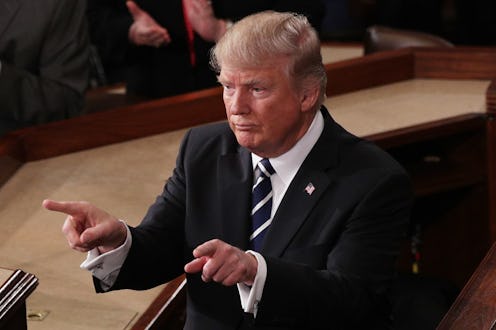News
Trumpcare Is Now Headed To The Senate

The House of Representatives voted to repeal Obamacare on Thursday, and so now, the only question is whether the Senate will pass Trumpcare as well. If it does, the Affordable Care Act will be a thing of the past, Planned Parenthood will be defunded, and tens of millions of Americans may well lose their health insurance. However, it's not at all a given that the American Health Care Act, as it's called, will pass the Senate — and it almost certainly won't in the form it's in now.
Although the text of the Obamacare repeal bill has changed over time, the basic politics surrounding repeal have not. On average, House Republicans are much more conservative than Senate Republicans, and the biggest challenge facing President Trump and GOP leadership has always been to craft a bill that's conservative enough to pass the House but moderate enough to pass the Senate. Additionally, there are limits what language can be included in the Senate bill that didn't apply in the House, and because Senate Republicans have a much slimmer majority than their counterparts in the House, the Senate bill can't pass if more than two Republican vote against it.
Thanks to all of these factors, Trumpcare was always going to face a tougher climb in the Senate than in the House. But is that climb insurmountable? Or will Senate Republicans successfully pass the bill and send it to Trump's desk? It's too soon to say for certain, but we can certainly speculate as to how this might play out.
Shortly after the House passed the bill, Senate Majority Leader Mitch McConnell announced that the Senate won't consider an Obamacare repeal bill until its policy impacts are graded by the Congressional Budget Office, and Sen. John Cornyn said there's "no timeline" for the Senate to pass it.
In any event, that CBO score will be the bill's first test. When the CBO graded the first version of Trumpcare back in March, it found that the bill would result in around 24 million people losing their health insurance. That, of course, created a lot of bad publicity for the bill, and most likely played a role in turning public opinion against it.
Many criticized House Republicans for passing this latest version of the bill before the CBO could grade it, and Senate Republicans will avoid that backlash if they wait for a CBO score. However, the flip side is that if CBO determines that this bill would also kick tens of millions of people off of their insurance plans, Republican Senators may become more reluctant to pass it for fear of angering their constituents.
This may be why some Senate Republicans are now saying that they won't be voting on the House bill at all, and will instead draft their own version of Obamacare repeal. Shortly after the AHCA passed the House, Sen. Charles Grassley told the Washington Examiner that he's "been told" the Senate will write a bill from scratch rather than take up the House version, and Sen. Roy Blunt said that Senate Republicans will attempt to "incorporate" elements of the House bill into its own legislation.
This is most likely because Republican leadership has concluded that the House version of the bill can't pass the Senate. Indeed, two Republican Senators have already said that they'd vote against the House version of the bill, which means they could only afford to lose one more member or the bill would fail. It makes sense that they're drafting a new bill. But if Senate Republicans pass a different — and in all likelihood, more moderate — version of Obamacare repeal, the House will then have to pass that version of the bill before it becomes law. It's not clear that this is possible, because again, House Republicans are much more conservative than Senate Republicans, and may reject a more moderate bit of legislation.
If the House rejects whatever the Senate passes, Republicans will have one last option: a conference committee. This is when members from the Senate and the House come together to write a compromise bill that can pass both chambers. But such a bill may not be possible, and so we're right back to where we started.
This could still go any number of ways, and it is possible that some form of Trumpcare becomes law. But the reason Trump and the GOP haven't been able to repeal Obamacare so far is that House and Senate Republicans can't agree on what a repeal bill should look like, and that fundamental fact hasn't changed just because the House passed the AHCA.